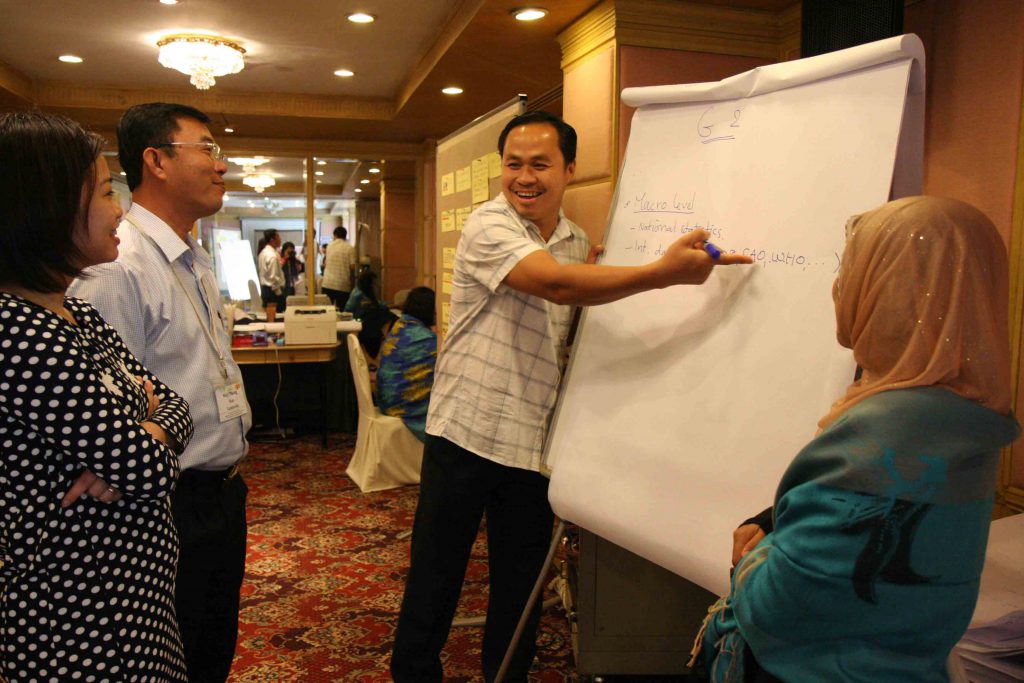Having more food does not necessary mean food
security. This sentence is being heard over many times during a four-day training on food and nutrition security for regional practitioners held for the first time by ASEAN Sustainable Agrifood Systems (SAS) project in Bangkok, Thailand on 23-26 March 2015.
Food security is…“Having enough food”, “Safe food to consume”, “Environmentally sustainable production”,
“Nutrition and healthy food”, “Anyone can access”, and “Sustainable supply on a stable basis”.
Twelve participants from six ASEAN Member States including Cambodia, Indonesia, Lao PDR, Myanmar, Thailand, and Vietnam shared their impressions on the term food security as an opening discussion of this first training aiming to raise awareness on the current situations of food and nutrition security for better promotion of sustainable food production that contributes
to food security at the national and regional levels.
Food security is not only about availability, says
Mr. Suriyan Vichitlekarn, a Senior Regional Advisor to ASEAN SAS project, but also accessibility, use and utilization.
Availability is having adequate and safe food while accessibility is when all households and members of the household are able to get appropriate nutritious food. Use is when people know what to select, what is a good composition in one meal, how to prepare food whereas
utilization is ability of an each individual to take and use food within the body. Whether one country is food secured it needs to consider these three dimensions.
Ms. Sri Sulihanti, Director of Center for Consumption Diversification and Food Safety from Indonesia says food availability in Indonesia is not a problem but accessibility and use and utilization are the problems.
The other participant from Indonesia, Ms. Wa Ode Asmawati, from a non-profit organization called Muhammadiyah, says she is very concerned about an amount of chemical fertilizer and pesticide used in agriculture production in her country
“I’m scared to eat the food but I have no choice and needs to exercise my extreme cautious,” she says. Ms. Wa Ode introduces an organic home gardening programme to her women’s community and runs a campaign on nutritious food for children with local schools.
Stability is an extra dimension that covers all the other earlier mentioned: availability; accessibility; and use and utilization to be leading to food security.
“To have enough food or being able to access to food for a certain period of time is not food secured,” says Dr. Georg Bokeloh, a trainer from Germany.
“It has to be three plus
one dimensions to be considered food secured.”
Mr. Cheattho Prak, a Deputy Director-General of General Directorate of Agriculture, Ministry of Agriculture, Forestry and Fisheries in Cambodia says before he attended this training he initially only concerned about producing sufficient food to meet the demands of the country.
“I’m now better aware that food security is also about having a sustained variety of nutritious and safe food. For example, children know about the kind of food they should eat, how to select and cook and eat properly,” he says. The training is organized under collaboration with GIZ Training Services Bangkok.
ASEAN Sustainable Agrifood Systems or SAS Project is part of the ASEAN-German Programme on Response to Climate Change in Agriculture and Forestry (GAP-CC) commissioned by the German Federal Ministry for Economic Cooperation and Development and being implemented by German International Cooperation (GIZ) and hosted by the Department of Agriculture, Ministry of Agriculture and Cooperatives in Thailand. The project aims to enable ASEAN Member States to implement the ASEAN Integrated Food Security (AIFS) Framework and its Strategic Plan of Action on Food Security in the ASEAN region (SPA-FS), Strategic Thrust 4: Promote Sustainable Food Production, at national level through the promotion of sustainable agrifood systems.
